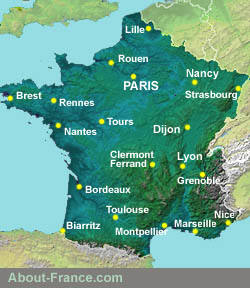French group 3 verbs - verbs in -re
Several hundred French verbs have an infinitive ending in -re.
But unfortunately for students of French - and that includes native French speakers! - they follow a multitude of different conjugation patterns. Some linguists have concluded that the best solution is to consider all these verbs as irregular verbs.
Nevertheless, within the -re group of verbs, there are several groups of verbs that are conjugated according to the same pattern.
Group 3.1. More than twenty common verbs conjugated on the model of vendre
attendre,
confondre, correspondre, défendre
, dépendre,
descendre, détendre, entendre
, étendre,
fendre, fondre , mordre,
pendre, perdre,
prétendre, rendre,
répandre, répondre,
suspendre, tendre , tordre , vendre
and verbs based on these. See Verb
table
vendre below.
Group 3.2. Verbs formed on the root prendre. See irregular verbs in -re
Group 3.3 Verbs ending in -uire, such as conduire. See irregular verbs in -re
Plus dozens more groups with one or just a few examples. These have to be learned one by one or group by group. See irregular verbs in -re
Sample verb vendre - to sell
This is the standard model only for the verbs listed above and their derivatives: many other verbs in -re form some of their tenses on the same model, but not others.For each tense, a sample English equivalent is given for the first person singular.
Table 1.
| Tenses (indicative) : | |||
| Person | Present (I sell, I am selling) |
Future (I will sell ) |
Imperfect (I was selling ) |
| 1st singular. | je vends | je vendrai | je vendais |
| 2nd singular | tu vends | tu vendras | tu vendais |
| 3rd singular | il elle on ... vend | il (..) vendra | il (..) vendait |
| 1st plural | nous vendons | nous vendrons | nous vendions |
| 2nd plural | vous vendez | vous vendrez | vous vendiez |
| 3rd plural | ils elles vendent | ils vendront | ils vendaient |
| Notes | |||
Table 2
| Tenses (indicative): | |||
| Person | Preterite (I sold ) |
Perfect (passé
composé) (I have sold ) |
Pluperfect (I'd sold ) |
| 1st singular. | je vendis | j'ai vendu | j'avais vendu |
| 2nd singular | tu vendis | tu as vendu | tu avais vendu |
| 3rd singular | il (..) vendit | il (..) a vendu | il avait vendu |
| 1st plural | nous vendîmes | nous avons vendu | nous avions vendu |
| 2nd plural | vous vendîtes | vous avez vendu | vous aviez vendu |
| 3rd plural | ils vendirent | ils ont vendu | ils avaient vendu |
| Notes | rare except in 3rd person |
||
Table 3
| Tenses (indicative): | |||
| Person | Future
perfect (I will have sold ) |
Conditional (I would sell ) |
Past
conditional (I would have sold ) |
| 1st singular. | j'aurai vendu | je vendrais | j'aurais vendu |
| 2nd singular | tu auras vendu | tu vendrais | tu aurais vendu |
| 3rd singular | il aura vendu | il vendrait | il aurait vendu |
| 1st plural | nous aurons vendu | nous vendrions | nous aurions vendu |
| 2nd plural | vous aurez vendu | vous vendriez | vous auriez vendu |
| 3rd plural | ils auront vendu | ils vendraient | ils auraient vendu |
| Notes | |||
Table 4
| Imperative | Present participle | ||
| Person | (sell
) |
selling | |
| 2nd singular | vends | vendant | |
| 1st plural | vendons | ||
| 2nd plural | vendez | ||
| Notes |
Table 5
| Tenses (subjunctive) : | |||
| Person | Present (may sell , may be selling) |
preterite (might sell) |
Perfect
(parfait) (may have sold ) |
| 1st singular. | je vende | je vendisse | j'aie vendu |
| 2nd singular | tu vendes | tu vendisses | tu aies vendu |
| 3rd singular | il, elle... vende | il vendît | il ait vendu |
| 1st plural | nous vendions | nous vendissions | nous ayons vendu |
| 2nd plural | vous vendiez | vous vendissiez | vous ayez vendu |
| 3rd plural | ils vendent | ils vendissent | ils aient vendu |
| Notes | (very rare) | ||
There are a few other tenses that are hardly ever used in modern French, except in very literary style.
The second pluperfect (passé antérieur) - which can be used instead of the pluperfect, and is formed on the model: j'eus vendu.
The pluperfect subjunctive - on the model: j'eusse vendu
The second past conditional - on the model: j'eusse vendu
Examples:
Je vends ma maison
I'm selling my house.
Il vendait toujours ses tableaux avant les autres.
He always sold his paintings before the others.
Vends-le aussi vite que possible !
Sell it as soon as possible!!
Je pense qu'il aura vendu sa collection avant la fin de l'exposition.
I think he'll have sold his collection before the exhibition's over..
J'ai peur qu'ils ne vendront rien à ces prix-là !
I'm afraid they won't sell anything at those prices.
Je vends ma maison
I'm selling my house.
Il vendait toujours ses tableaux avant les autres.
He always sold his paintings before the others.
Vends-le aussi vite que possible !
Sell it as soon as possible!!
Je pense qu'il aura vendu sa collection avant la fin de l'exposition.
I think he'll have sold his collection before the exhibition's over..
J'ai peur qu'ils ne vendront rien à ces prix-là !
I'm afraid they won't sell anything at those prices.
| Return to French grammar pages : index | Full site index | Essential French words and phrases for travellers |




